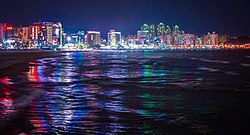Pohang
포항시 | |
|---|---|
| Korean transcription(s) | |
| • Hangul | 포항시 |
| • Hanja | 浦項市 |
| • Revised Romanization | Pohang-si |
| • McCune–Reischauer | P'ohang-si |
 Pohang by night | |
 Location in South Korea | |
| Country | South Korea |
| Region | Yeongnam |
| Administrative divisions | 2 gu, 15 dong, 4 eup, 10 myeon |
| Government | |
| • Mayor | Lee Kang-deok (People Power) |
| Area | |
• Total | 1,128.76 km2 (435.82 sq mi) |
| Population (September 2024[1]) | |
• Total | 492,041 |
| • Density | 442.40/km2 (1,145.8/sq mi) |
| • Dialect | Gyeongsang |
| Demonym | Pohangite |
| Time zone | UTC+9 (Korea Standard Time) |
| Area code | +82-54-2xx |
Pohang (Korean: 포항; Korean pronunciation: [pʰo.ɦaŋ]), formerly spelled Po-Hang, is the largest city in North Gyeongsang Province, South Korea, with a population of 499,363 as of 2022, bordering the Sea of Japan to the east, Yeongcheon to the west, Gyeongju to the south, and Cheongsong and Yeongdeok to the north.
The city has food, textile, and metal industries. Agricultural products such as grapes, persimmons and garlic chives are abundant, and the city's proximity to the Sea of Japan has led to the development of a fishing industry. Hagfish is a local specialty.
The Korean Marine Corps 1st Division is stationed in Pohang, and their Education and Training Command is located there as well.
Tourist attractions include the Jukdo Fish Market, where fresh seafood is sold, as well as the Yeongildae Beach, Wolpo Beach, and Pohang Songdo Beach. Naejangsan Mountain divides Pohang and Yeongdeok and has twelve waterfalls.[2]
- ^ "Population statistics". Korea Ministry of the Interior and Safety. 2024.
- ^ 포항12경 [12 Views of Pohang]. www.pohang.go.kr (in Korean). Retrieved 2023-04-21.
